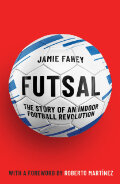Brazil, Falcão and futsal World Cup pivot power
EXCLUSIVE extract: Chapter 11, Brazil: The Gold Mine
FOR MARCOS ‘Marquinhos’ Xavier Andrade, the celebrated coach of the Brazil men’s futsal team, the legendary Falcão stands tall as the figure who embodies the trademark Brazilian approach of inteligência (intelligence) and sendo livre (freedom) that defines futsal. No surprise, given the man labelled ‘the Pelé of futsal’ amassed a world-record 401 goals in 258 appearances for Brazil.
‘Falcão had all the qualities that the futsal game requires,’ Marquinhos tells me.
‘Technique, intelligence, physicality, mentality. We have very good athletes in Brazil now, but some don’t have all the requirements like Falcão. It’s going to take a while to find a player like him.’
Speaking after a guest coaching session in 2019 with the strongest team in England, London Helvécia, Marquinhos tells me futsal is about using inteligência to seek out and exploit two-v-one opportunities all over the court. Futsal is a speed game, he insists.
It’s also hugely psychological. It’s about pensamento, tempo, accao. He’s talking about ‘thinking, timing and the action’. This transfers directly to football, where the space and time afforded is much greater. In Brazil, futsal is everywhere, he says.
‘All over the country. In schools, community clubs, local associations... until nine or ten they play only futsal. At this age they are introduced to football and then have a mix for a few years. Then they reach a crossroads, where they choose football or futsal. It’s about fifty-fifty. Half choose futsal, half football.’
“Our relationship with football is that we are providing a service free of charge.”
This is why Brazilian futsal is the renowned treinador (coach) for the eleven-a-side game, he says. We talk about Falcão, and about the long list of exports to football, from Pelé and Rivellino to Rodrygo at Real Madrid. The sport deserves more respect, he insists.
‘What all these players, along with sessions like this one today, show is that our relationship with football is that we are providing a service free of charge.’ Futsal is far more than simply football’s treinador. It’s seen as very much a separate sport, with football sections conspicuously absent from the big LNF futsal clubs. Marquinhos acknowledges that the traditional culture of playing futebol de salão ‘everywhere and anywhere’ with the bola pesada – ‘and since the 1990s the bigger futsal ball’ – is changing markedly.
“We have a good squad but not good as a team yet.”
‘In Brazil we still have several remote, small towns where there is no violence and the kids can still play outside... but in the big cities it is more difficult to find space because of the gang violence. About 80 to 90 per cent of pro football players you see now came from the suburbs, the periferia, where there is less violence.’
So who is emerging to replace the retired Falcão in futsal? ‘Leandro Lino is perfect – for his age. He has loads of potential. Today in Brazil he is the best player.’
Since we spoke another young ala for the Brazilian champions Magnus Sorocaba, Leozinho, burst on to the scene to win best young player in the world in 2019.
‘We have a good squad but not good as a team yet,’ warns Marquinhos, who also heaps praise on the Magnus and Brazil captain, Rodrigo, and the Barcelona pivot Ferrão.
Rodrigo is a formidable fixo with ferocious shooting power who led Magnus to a third consecutive Intercontinental Cup in 2019, adding to his first with fellow Brazilian giants Carlos Barbosa in 2012. Nicknamed La Pantera (The Panther), Ferrão hails from Chapeco, in the heart of the state in Brazil known as ‘La Tierra Santa del Futsal’ (The Holy Land of Futsal): Santa Catarina, where the people are defined by the long history of immigration from Italy and Germany once coal was discovered there in the nineteenth century.
Along with his fellow Chapecoense pivot, Pito, who plies his trade at Barcelona’s big rivals in Spain, Inter Movistar, [he switched to Barcelona in 2021] he hails from an ‘inexhaustible quarry’ of futsal stars. In 2019, Marquinhos told Gustavo Muñana, a Spanish journalist and futsal analyst for the SEUR website, how people from the region had an ‘inherited innate quality to fight adversities’ that shows itself on the futsal court due to the relative dearth of high-profile football clubs in the region.
Ferrão’s bespoke version of the pivot’s subtle combination of elegance and power was no more evident than in an Intercontinental Futsal Cup clash against China’s Shenzhen Nanling Tielang in 2019, when the Barcelona man dispossessed an opponent before scooping the ball over the advancing goalkeeper’s head and into the net. Five sublime touches in as many seconds left a quintet of opponents dumbfounded. A clip of the goal on Instagram attracted three million views.
At the World Cup in Lithuania, it could be Santa Catarina state’s pivot power that fires Brazil to glory.
Have something to share? Add your comment below.









ENGLAND MEN’S futsal team is back. To mark the historic return, here’s an exclusive extract from Futsal: The Indoor Game Revolutionizing World Soccer focusing on the last time they competed in main round qualifiers